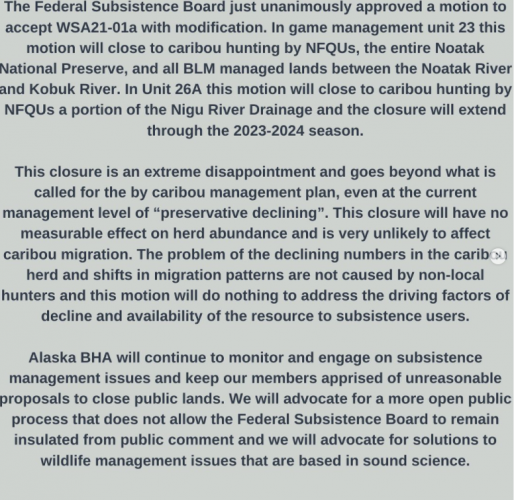N_8
Active member
Well as federally qualified subsistence user, who just spent $320 just to walk through the doors at Costco (discounted ticket), I’m not sure calling the proponents of this emergency closure selfish fX#!//s or applying appalling examples of rural hunter practices to the whole group (isn’t that the peta playbook) is helpful.
In my experience, all kinds of user groups/industry try to work the levers of Alaska’s regulatory process to their advantage.
I like Tyler, and I agree that the non-resident seasons should not be closed for such a vast area. At first, I was happy to see a lot of stakeholder interest on this proposal, after all the unit 13 closure had a grand total of 14 commentators, but from some of the comments I’ve seen around on social media, there is a danger this thing could go sideways. When testifying don’t bring your personal cocktail of political opinions to the table.
The hearing isn’t about Biden trying to shut down hunting. The proposal originated with Alaskans. The hearing isn’t about whether rural residents should have a preference or if the feds should be involved. They do and are. The hearing isn’t about whether rural limits are fair. They are not, neither is a $14 dollar six pack of Alaskan amber.
The hearing also isn’t exclusively about the caribou population although that is one of the factors they must consider.
The hearing is about whether closing the whole unit is a reasonable measure to preserve subsistence harvest. There is a good case that it isn't.
Before drawing lines in the sand and getting vitriolic, consider the rural user who just boated for two days and isn't finding game while watching bush planes on horizon all day long. His grandfather probably only saw a few planes all season. I imagine it’s a little like having a tough day in the Idaho elk woods and seeing wolf sign all over the place.
In my experience, all kinds of user groups/industry try to work the levers of Alaska’s regulatory process to their advantage.
I like Tyler, and I agree that the non-resident seasons should not be closed for such a vast area. At first, I was happy to see a lot of stakeholder interest on this proposal, after all the unit 13 closure had a grand total of 14 commentators, but from some of the comments I’ve seen around on social media, there is a danger this thing could go sideways. When testifying don’t bring your personal cocktail of political opinions to the table.
The hearing isn’t about Biden trying to shut down hunting. The proposal originated with Alaskans. The hearing isn’t about whether rural residents should have a preference or if the feds should be involved. They do and are. The hearing isn’t about whether rural limits are fair. They are not, neither is a $14 dollar six pack of Alaskan amber.
The hearing also isn’t exclusively about the caribou population although that is one of the factors they must consider.
The hearing is about whether closing the whole unit is a reasonable measure to preserve subsistence harvest. There is a good case that it isn't.
Before drawing lines in the sand and getting vitriolic, consider the rural user who just boated for two days and isn't finding game while watching bush planes on horizon all day long. His grandfather probably only saw a few planes all season. I imagine it’s a little like having a tough day in the Idaho elk woods and seeing wolf sign all over the place.





